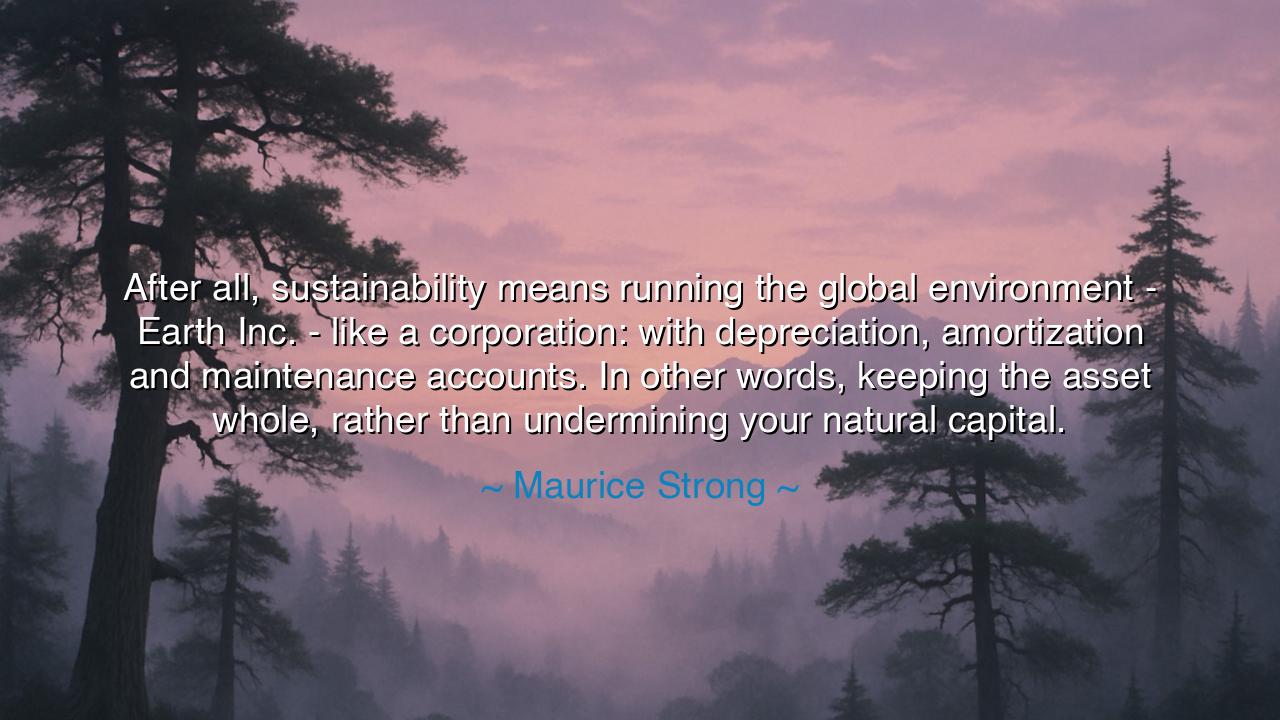
After all, sustainability means running the global environment -
After all, sustainability means running the global environment - Earth Inc. - like a corporation: with depreciation, amortization and maintenance accounts. In other words, keeping the asset whole, rather than undermining your natural capital.






When Maurice Strong declared, “After all, sustainability means running the global environment—Earth Inc.—like a corporation: with depreciation, amortization and maintenance accounts. In other words, keeping the asset whole, rather than undermining your natural capital,” he spoke with the clarity of a steward and the vision of a prophet. His words do not reduce nature to commerce—they elevate commerce to conscience. In the modern tongue of economics, he reminds us of an ancient truth: that the Earth is our greatest asset, and that wisdom demands we protect and renew it, not consume it until it is gone. What he calls “natural capital” is what the ancients would have called “the sacred inheritance”—the rivers, forests, soils, and skies that sustain all life.
Strong’s message was born from his work as one of the fathers of the global environmental movement. As the founder of the United Nations Environment Programme and architect of the 1992 Earth Summit, he saw with rare clarity the intersection of economy and ecology. To him, sustainability was not a poetic ideal but a practical framework—a way for humanity to manage the planet as it would manage any great enterprise. For every company that fails to maintain its equipment, to account for depreciation, to reinvest in its resources, soon falls into ruin. So too, he argued, would civilization collapse if it continued to spend the wealth of the Earth without replenishing it. To “keep the asset whole” was not merely economic prudence—it was moral duty.
The wisdom of Strong’s words stretches back to the philosophy of balance that guided the ancients. The Egyptians spoke of Ma’at, the order and harmony of the cosmos, which must be upheld by righteous kings. The Greeks knew of sophrosyne, the virtue of moderation. The Chinese sages of old taught the Tao, the way of alignment with the natural flow of life. Each tradition, in its own tongue, said what Strong now expressed in the language of modern governance: that prosperity divorced from balance leads to decay. To take more than one restores is to invite collapse. The Earth, like any living organism—or any corporation—must have maintenance. Without it, wealth turns to waste, and growth turns to ruin.
Consider the story of Easter Island, a tale carved into the bones of time itself. Its people, once thriving, cut down the forests to build their monuments and feed their fires. They thought the trees endless, their wealth eternal. But when the last tree fell, the soil eroded, the crops withered, and famine came. The island that had been a paradise became a graveyard. They had consumed their natural capital, mistaking the abundance of nature for infinite credit. Strong’s warning is the same: a world that treats the planet as expendable will one day discover that no profit can purchase a lost sky, a dead ocean, or a vanished species.
Yet Strong does not speak in despair; his vision is one of renewal. To “run Earth Inc.” wisely means to see ourselves not as owners, but as stewards—temporary guardians of an inheritance that belongs to all generations. Just as a good manager reinvests in his company’s future, so must humanity reinvest in the Earth: restoring forests, protecting waters, nurturing the soils, and respecting the boundaries of what the planet can give. Depreciation is inevitable in all systems—but with care, it can be balanced by restoration. Sustainability, then, is not restraint alone—it is the art of regeneration, the craft of ensuring that life continues to flourish even as we draw upon it.
His metaphor of Earth as a corporation also challenges the arrogance of power. In this vision, no nation, no ruler, no industry is above accountability. The board of directors is the community of nations; the shareholders are the billions of living beings—human and more-than-human—who depend upon the planet’s health. Every decision, every extraction, every policy becomes a line on the great ledger of the Earth, where profit cannot be counted without cost. The wise leader must ask: are we increasing the wealth of our natural capital, or depleting it for temporary gain? For what shall it profit a civilization to gain the world, yet lose the world itself?
So let the teaching of Maurice Strong be carried forward as a beacon of wisdom in this age of consumption: the Earth is not a possession, but a partnership. Treat her with the prudence you would give to the foundation of your livelihood; nurture her as you would a treasury whose loss cannot be recovered. Reinvest in her forests, her air, her oceans, her people. Live not as spenders of creation, but as its caretakers. For in truth, we are all employees of Earth Inc., bound by one contract—to keep the asset whole. And if we do so, not only will our world endure, but we ourselves will thrive, forever enriched by the harmony between human ambition and the living wisdom of the planet that sustains us.






AAdministratorAdministrator
Welcome, honored guests. Please leave a comment, we will respond soon